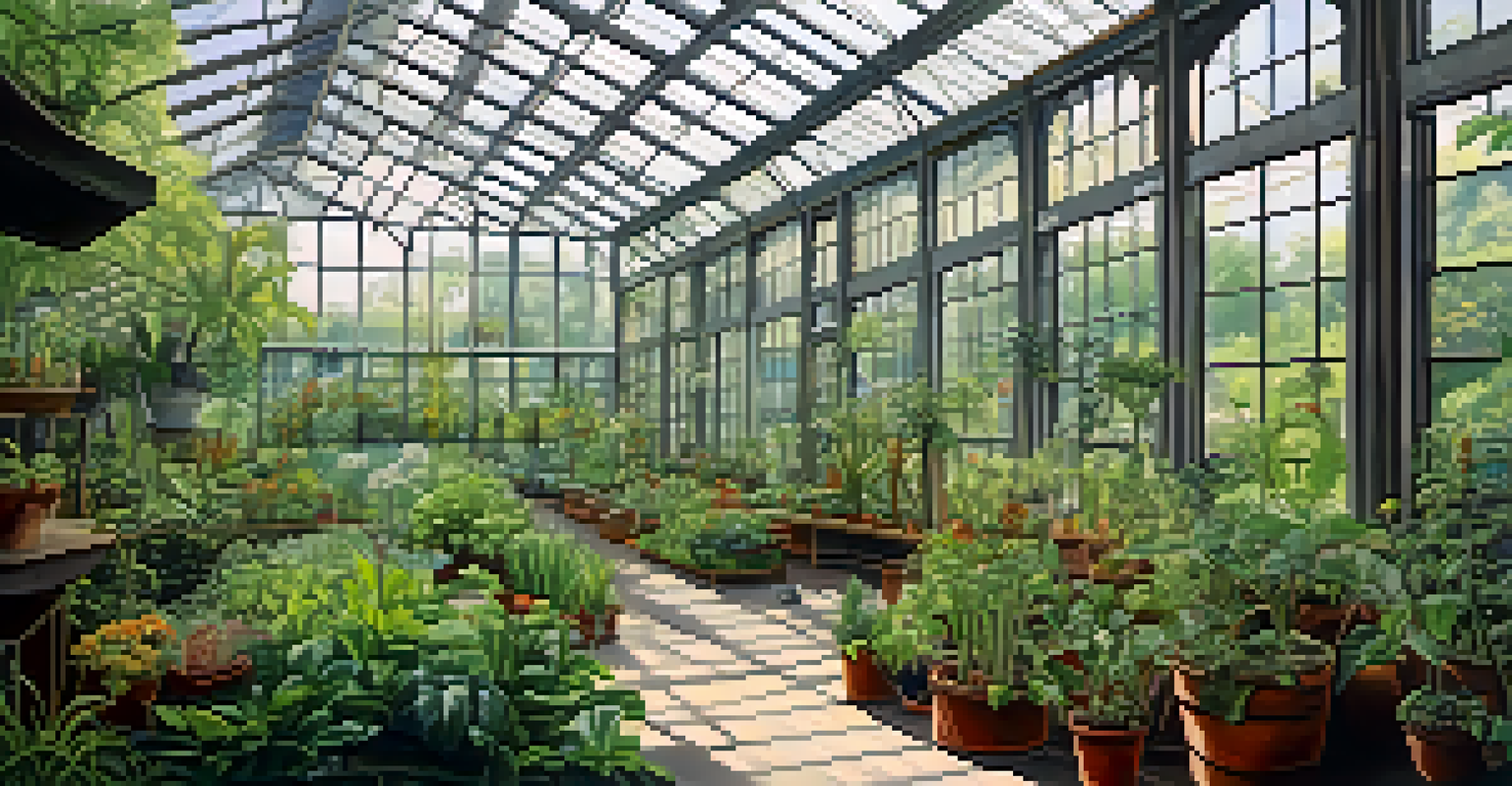Botanical Gardens as Research Centers for Medicinal Plants

Introduction to Botanical Gardens and Their Importance
Botanical gardens have long been cherished as tranquil spaces filled with diverse plant life. However, their role extends far beyond mere aesthetics; they are vital centers for research and conservation. These gardens serve as living laboratories, showcasing a variety of plant species, many of which hold medicinal properties.
Plants are the original source of all medicine.
In recent years, the importance of studying medicinal plants has surged, driven by a growing interest in natural remedies and alternative medicine. Botanical gardens are uniquely positioned to spearhead this research, offering a controlled environment where scientists can conduct experiments and gather data. This intersection of horticulture and research allows for a deeper understanding of plant biology and their potential therapeutic uses.
Moreover, botanical gardens act as repositories of knowledge, housing expert staff who can guide research initiatives. By collaborating with universities and research institutions, they help bridge the gap between traditional knowledge and modern science, ultimately enhancing our understanding of the healing potential of plants.
The Role of Medicinal Plants in Traditional Medicine
Medicinal plants have been utilized in traditional medicine systems for centuries, providing remedies for various ailments. Cultures around the world have relied on these natural resources, often passing down knowledge through generations. The effectiveness of many medicinal plants has been validated by modern science, leading to a renaissance in their study.

For instance, plants like willow bark and foxglove have historical significance in traditional remedies and have been scientifically proven to be effective in pain relief and heart conditions, respectively. This rich history underscores the importance of preserving traditional practices while also exploring their scientific foundations. Botanical gardens are crucial in this regard, as they cultivate these plants and maintain their genetic diversity.
Botanical Gardens as Research Hubs
These gardens serve as vital centers for studying medicinal plants, blending traditional knowledge with modern scientific research.
By studying these plants within botanical gardens, researchers can investigate their chemical compounds and potential health benefits. This not only honors traditional practices but also encourages the development of new pharmaceuticals derived from these natural sources.
Conservation Efforts and Biodiversity in Botanical Gardens
One of the critical functions of botanical gardens is the conservation of plant species, particularly those that are endangered or at risk. With many medicinal plants facing habitat loss and climate change, these gardens play a pivotal role in preserving genetic diversity. They provide a sanctuary for these plants, ensuring that future generations can benefit from their medicinal properties.
The future will be about protecting nature, and protecting nature will be about preserving biodiversity.
Botanical gardens often collaborate with conservation organizations to protect threatened species. They engage in seed banking, propagation, and habitat restoration projects, all aimed at safeguarding biodiversity. By cultivating rare and endangered medicinal plants, these gardens contribute to the global effort to maintain ecological balance.
Furthermore, educational programs within botanical gardens raise awareness about the importance of plant conservation. Visitors learn about the significance of biodiversity and the role of medicinal plants in health, inspiring a new generation of conservationists and researchers.
Research Initiatives and Collaborations in Botanical Gardens
Botanical gardens frequently engage in research initiatives that explore the therapeutic potential of medicinal plants. These projects often involve collaborations with universities, pharmaceutical companies, and healthcare organizations. Such partnerships enhance the scope of research, allowing for more comprehensive studies and innovative applications.
For example, researchers may investigate the anti-inflammatory properties of a particular plant species or explore its potential in cancer treatment. By gathering data in a controlled environment, botanical gardens provide valuable insights that can lead to new medicinal discoveries. Their contributions help bridge the gap between field research and clinical applications.
Conservation of Medicinal Plants
Botanical gardens play a key role in preserving endangered plant species, ensuring their genetic diversity and medicinal properties for future generations.
Additionally, botanical gardens often host workshops and seminars, fostering a community of researchers and practitioners dedicated to the study of medicinal plants. These gatherings stimulate knowledge exchange, paving the way for future discoveries and advancements in the field.
Educational Programs Promoting Medicinal Plant Knowledge
Educational outreach is a vital component of botanical gardens, allowing them to share their research and findings with the public. Programs designed to educate visitors about the significance of medicinal plants play a crucial role in raising awareness and appreciation. These initiatives often include guided tours, workshops, and hands-on activities.
Children and adults alike can learn about the various uses of plants in medicine, as well as their ecological importance. By engaging the community, botanical gardens foster a connection between people and nature, encouraging stewardship of the environment. This educational aspect not only informs but also inspires individuals to explore natural remedies and sustainable practices.
Through these programs, botanical gardens cultivate a sense of curiosity and respect for medicinal plants, empowering visitors to appreciate the intricate relationships between health, wellness, and biodiversity.
Challenges Faced by Botanical Gardens in Research
While botanical gardens are essential for research on medicinal plants, they face several challenges. Limited funding often hinders their ability to conduct extensive research or expand their facilities. As a result, many gardens must be creative in securing resources, relying on grants, donations, and partnerships to sustain their initiatives.
Additionally, the rapid pace of climate change poses a significant threat to plant diversity. Many medicinal plants are sensitive to environmental changes, and their habitats are increasingly at risk. Botanical gardens must adapt their conservation strategies to address these challenges, ensuring that they can continue to preserve and study these valuable resources.
Educational Outreach and Awareness
Through engaging educational programs, botanical gardens inspire public appreciation of medicinal plants and their ecological significance.
Moreover, there is a constant need for updated research methods and technologies. Botanical gardens must invest in training their staff and acquiring new tools to remain at the forefront of medicinal plant research. Balancing these challenges while continuing their mission of education and conservation is essential for their long-term success.
The Future of Botanical Gardens in Medicinal Plant Research
Looking ahead, botanical gardens are poised to play an even more significant role in medicinal plant research. As interest in natural remedies continues to grow, these gardens can serve as hubs for innovation and discovery. Their unique position allows them to combine traditional knowledge with modern scientific techniques to uncover new therapeutic potentials.
Furthermore, as global challenges like climate change and biodiversity loss become increasingly pressing, botanical gardens can lead efforts in sustainable practices. By promoting the cultivation and use of medicinal plants, they contribute to a healthier planet and society. Their research can inform conservation strategies and guide policy decisions regarding the use of plant resources.

In conclusion, botanical gardens will remain vital players in the field of medicinal plant research. Their continued commitment to education, conservation, and collaboration positions them as beacons of hope in the quest for understanding the healing power of nature.